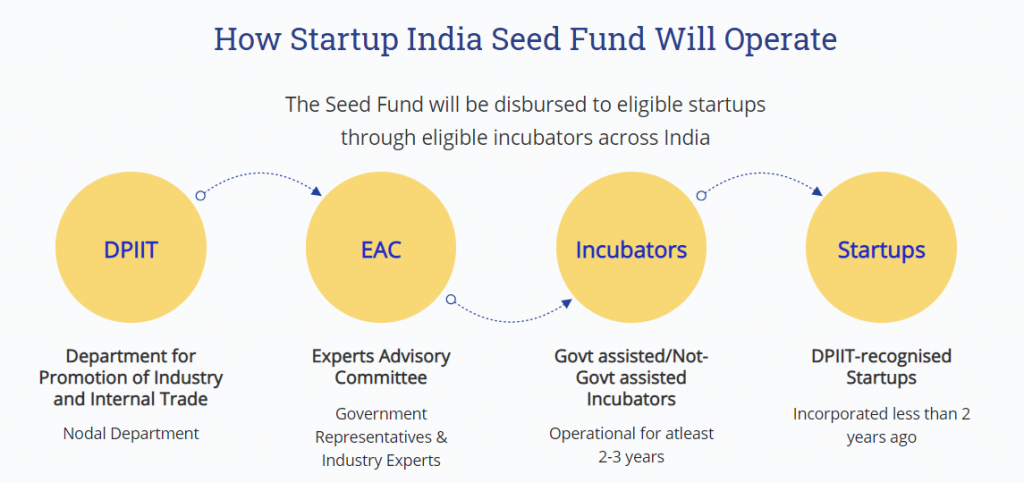
In News
Recently, the Union Minister of Commerce and Industry has unveiled the Startup India Seed Fund Scheme (SISFS), almost three months after the Centre announced the plan.
Background
- It was announced by the Prime Minister of India in January 2021 marking the five-year anniversary of the Startup India initiative.
- The PM, at the Startup India’s international summit, ‘Prarambh’, highlighted that the government is trying to create a startup system, which is based on the mantra ‘of the youth, by the youth, for the youth’.
Need
- Easy availability of capital is crucial for entrepreneurs at the early stages of growth of an enterprise.
- Angel investors and venture capital firms only provide funding after the proof of concept has been provided. Similarly, banks provide loans only to asset-backed applicants.
- It is necessary to provide seed funding to startups with an innovative idea to conduct proof of concept trials.
About SISFS
It has been created by the Department for Promotion of Industry and Internal Trade (DPIIT).
- Objective: It aims to provide financial assistance to startups for proof of concept, prototype development, product trials, market entry and commercialisation.
- Funding: A sum of Rs. 945 crore has been allocated for the fund over the next four years for providing seed funding to eligible startups.
- Grants of up to Rs. 5 crore shall be provided to eligible incubators selected by an expert committee.
- They shall be offered grants of up to Rs. 20 lakh for validation of proof of concept, prototype development or product trials.
- Furthermore, investments of up to Rs. 50 lakh shall be provided to startups for market entry, commercialization or scaling up through convertible debentures or debt-linked instruments.
- Grants of up to Rs. 5 crore shall be provided to eligible incubators selected by an expert committee.
- Significance
- The fund is expected to benefit around 3,600 startups through 300 incubators and boost the startup ecosystem, particularly in tier-2 and 3 cities.
- It will secure seed funding, inspire innovation, support transformative ideas, facilitate implementation and start a startup revolution.
- It will create a robust startup ecosystem, particularly in non-metros, which are often deprived of adequate funding.
- It will allow incubators to apply for funds through an online portal created by the DPIIT.
- An Experts Advisory Committee (EAC) has been created by DPIIT to execute and monitor the scheme.
- It will evaluate and select incubators for allotment of Seed Funds, monitor progress, and take all necessary measures for efficient utilization of funds towards fulfilment of objectives of the scheme.

(Image Courtesy: SISFS)
Startups in India
- There are over 41,000 startups in the country and 44 per cent of these ventures are officially recognized.
- More than 5,700 startups are in Information Technology (IT), around 3,600 in healthcare and over 1,700 in agriculture.
- These startups are changing the demographic character of business. Currently, India is one of the biggest nations in the startup ecosystem.
- Despite the pandemic-led disruption, 11 startups turned unicorns in 2020 and over 30 today are valued at over USD 1 billion.
Initiatives for Promoting Startups
- Atmanirbhar Bharat: Digital India Atmanirbhar Bharat App Innovation Challenge.
- Make in India: Promotion to indigenously made goods and services under the initiative.
- Start-Up India Programme: A flagship initiative, intended to build a strong eco-system for nurturing innovation and start-ups in the country to drive sustainable economic growth and generate large scale employment opportunities.
- Start-up India Digital Platform: It is the world’s largest virtual incubator with over 300,000 registered start-ups and aspiring entrepreneurs.
- Start-up Grand Challenge: It channelizes the entrepreneurial capacity between Indian and Korean start-ups to work together and build solutions for the challenges facing the world.
- Atal Innovation Mission (AIM): Launched by NITI Aayog as a flagship programme, it aims to promote a culture of innovation and entrepreneurship in India.
- Some initiatives of AIM are AIM iCREST and Mentors of Change.
- Project Chunauti: It is a start-up challenge under the Next Generation Incubation Scheme (NGIS) initiative. Selected startups are provided human resources, legal, intellectual property rights (IPR) and Patent matters guidance as well as other incubation and mentorship facilities.
- National Initiative for Developing and Harnessing Innovations (NIDHI): It is an umbrella programme for nurturing ideas and innovations (knowledge-based and technology-driven) into successful startups.
Source: LM
Previous article
India on Currency Monitoring List
Next article
Facts in News